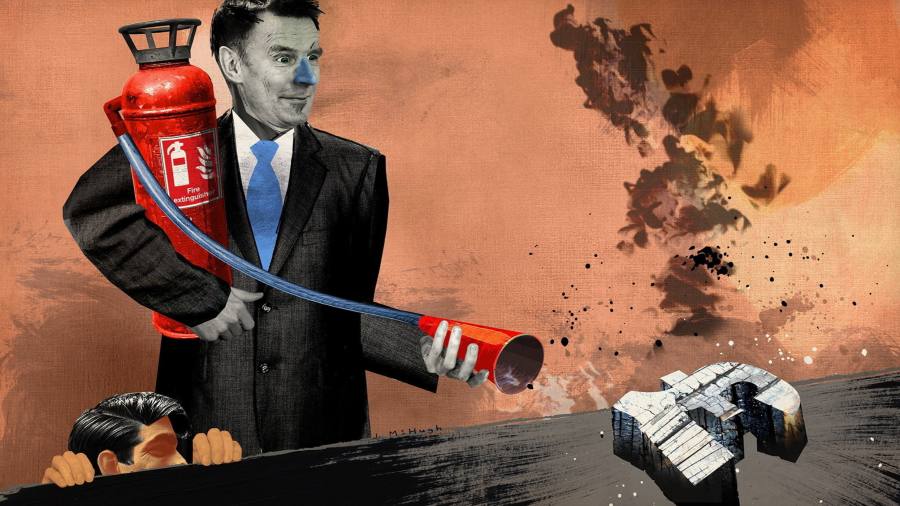
Usually after a Budget, there is a debate about who’s won and who’s lost. But as Jeremy Hunt squared up to the task of reassuring the markets with his Autumn Statement, there could be no real winners. Taxes whacked up to their highest level since the second world war, household disposable incomes set to fall by a historic amount. And scant hope ahead because of the word that is still taboo for every Labour and moderate Tory politician: Brexit.
As the hail of figures and forecasts rained down from the chancellor, I felt as though I was standing under a cold shower — it was shocking, unbearable, but also refreshing. After three years of bluster and delusion, we finally have a grown-up government again. Liz Truss’s ludicrous “mini” Budget allowed the UK economy to be savaged by the bond markets. But it also exposed the damage done by Boris Johnson’s shoddy and incomplete Brexit deal, and his fondness for making grand gestures with other people’s money.
Voters would be forgiven for wondering who the Conservatives really are. The party which only three months ago seemed to applaud Truss’s promised £50bn tax cuts, is now grimly accepting £55bn of spending cuts and new tax rises. Shadow chancellor Rachel Reeves’s quip that “the mess we are in is the result of 12 weeks of Conservative chaos and 12 years of Conservative economic failure” will have bitten deep. It reminds voters that all the characters in this bizarre soap opera hail from the same political side — no matter how they try to shrug off their predecessors.
Hunt’s primary task was to restore the UK’s credibility without tipping the country into an even deeper recession. His own capable demeanour had already helped to calm the markets. By promising to reduce debt, and to preserve the Bank of England’s remit, he and Rishi Sunak, the prime minister, seem to assume they can afford to push the deepest spending cuts beyond the next election — and they are probably right.
The next, urgent, job is to quell inflation. So much depends on what happens to energy prices, which are currently eight times higher than they were before Russia invaded Ukraine. The decision to extend energy price support beyond April was surprising, given the gargantuan cost, but I read it as a hedge. If the war ends, inflation will abate and the package will be unnecessary. If the war continues, the support will be deflationary. Inflation, energy prices and interest rates are the ongoing uncertainties which loom over us all.
Hunt and Sunak are not obvious bedfellows. But with Britain’s credibility on the line, they know they must avoid any hint of the “TB-GBs”, the tension between Tony Blair and his chancellor Gordon Brown which plagued New Labour’s tenure. They also share a commitment to two vital principles: protecting the most vulnerable and asking the wealthy to pay more. Hunt is in some ways the elder statesman, the experienced cabinet minister who, for once, doesn’t want his boss’s job. Sunak is the relative newcomer whose meetings with world leaders at the G20 summit were sure-footed and constructive in comparison to those of Truss and Johnson.
In wielding a scalpel rather than the axe, Hunt has avoided an “Austerity 2.0” — while quietly dragging millions of people into higher tax bands. He and Sunak have also revitalised something that Johnson was woefully uninterested in — public service reform. Some see the appointment of Blair’s former adviser Sir Michael Barber on skills, and former Labour health minister Patricia Hewitt on the NHS as cynical, but it imports some genuine expertise.
Given that this government has only 18 months or so left to run, it sounds surprisingly ambitious. Sunak, who has long been passionate about skills, will prioritise an overhaul of the apprenticeship levy and vocational training. But he must also get to the bottom of why so many people of working age are not working. Average weekly hours worked are still not back to pre-pandemic levels. It’s a complex picture, but it is a brake on growth.
Can this government unite its warring troops through a challenging winter? Tory MPs are unlikely to bring down a government which is putting competence before ideology. But the splits remain. As chancellor, Sunak had a reputation of wanting to be open about trade-offs, including those created by pandemic lockdowns which he urged Johnson to end earlier. Will he now be honest about the consequences of Brexit? The OBR is forecasting that the UK will experience the steepest economic contraction in Europe next year.
Support for Brexit has hit a record low among voters, with 56 per cent now saying it was the wrong decision, compared to 32 per cent in favour. The problems will dog this administration. Sunak has appointed his chief scientific adviser Sir Patrick Vallance to review the regulation of innovative industries. Vallance has consistently said that science depends on international collaboration — something which has been stymied since February because of the stalemate with the EU over the Northern Ireland Protocol. Unless that is fixed, Britain will lose further ground in the race to be a science superpower — and no amount of R&D announcements will hide it.
What’s the point of the Conservatives if they just raise taxes and co-opt former Blairites to work on policy? That’s a good question. But although Labour is comfortably 20 points ahead in the polls, Keir Starmer needs to accelerate his own policy development. Hunt and Sunak have restored competence to government. But economic growth is elusive; and on that our futures depend.
.